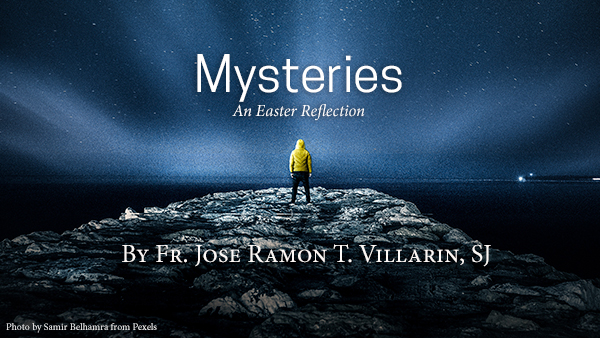


Fr. Jose Ramon T. Villarin, SJ
May 7, 2019
At the heart of a happy Easter is the Resurrection, which is a glorious mystery. What is glorious is not always obvious or readily recognizable. Yes, the shining white of angels or the transfigured face of Jesus on the mountain can be a glorious sight to behold. For most of our time though, glory is subtle. It runs beneath the surface and under the color of our faces. It is a mystery not equal to happy or joyful.
The Resurrection account of today is a mystery story. It is not entirely glorious however. There are sorrowful and joyful mystery moments in it as well.
The story begins at night. The apostles decide to go back to fishing. They are shadowed by grief, despair, and lostness. They work all through the night, hoping this might get them going again. But their nets are as hollow as their hearts. There in the dark, they are haunted by moments of emptiness and desolation, by sorrowful mystery.
At daybreak, a man on the shore asks them about their catch. They must have been fishing close to shore for them to have heard him. He then tells them to cast their net again and promises that they “will find something.” They do. Despite the shallow water, their nets are heavy and full. Déjà vu. At dawn, they are lifted up by moments of fullness and recognition, by joyful mystery.
On the shore, there is a fire “with fish on it and bread.” The mystery man with a different face and voice tells them to put into the fire some of the fish they had just caught. Then, he invites them, “Come, have breakfast.” With hearts burning inside them, they do. When he takes the bread and gives it to them, they remember. Déjà vu.
After the meal, the man then takes Peter for a stroll on the shore and asks the poor fisherman for his love. A triple profession of love in parallel to a previous triple denial of love. Déjà vu. A triple confession of love that then leads up to a triple call to love and care for others. By the shore, we (and not only Peter) are invited to an intimate moment of reconciliation and recommitment, to glorious mystery.
Sorrowful, joyful, and glorious. These three mysteries are embedded in our lives. They may come in waves, but they do so never just linearly or sequentially. Glorious does not always follow joyful, nor does sorrowful always come after glorious. They are a triple and our redeemed lives are interwoven with these mysteries. Easter time, which is our time, is glorious because it is not without the sorrowful and joyful.
This means we cannot just allow one mystery to dictate or define our lives. For instance, the sorrowful has a way of burying us more deeply into sorrow, from dark to darker, intensifying itself as it unravels the things that hold us together. When we lose our way in the dark, we also lose our memory of the joyful and the glorious even if these are still very much embedded in our lives. And when we forget, we scatter.
The joyful too has a way of forgetting what should not be forgotten. Instead of radiating outward, the joyful moment diminishes itself when it is so inebriated it forgets the source and giver of every mystery of joy in our lives. In such times of numbness, the joyful can be dismissive of the mystery of sorrow and darkness. When so deluded, joy contracts itself into ingratitude and giddiness.
The glorious moments in our lives can only mean something if we have been through the mysteries of sorrow and joy. Glory is the victorious face of Christ, transfigured by the scars that remain from his crown of thorns.
Glorious are the disciples who were once hiding in fear and now have found new courage to make known “the name” of Jesus Christ. Glorious are the followers of Christ who were thrown into prison and have now been emboldened to defy the “captain and the court officers” and the Sanhedrin, proclaiming to them all that “we must obey God rather than men.” Glorious are they who “left the presence of the Sanhedrin, rejoicing that they had been found worthy to suffer dishonor for the sake of the name.”
Rejoicing to suffer for the glory of God’s name. Joyful, sorrowful, glorious. Now we know there is more to happy in a happy Easter.